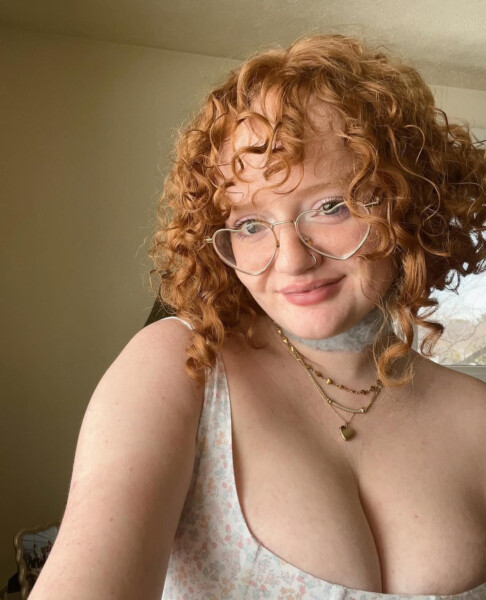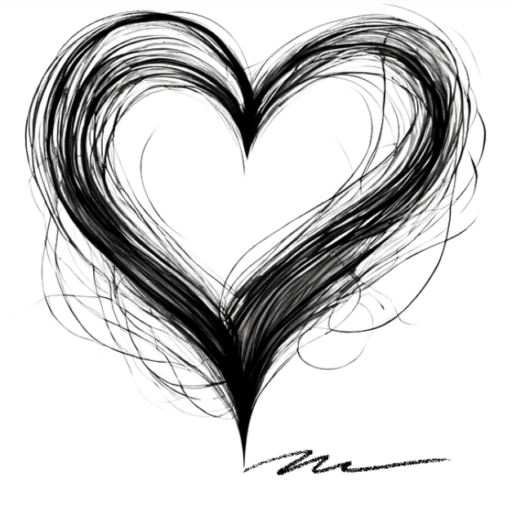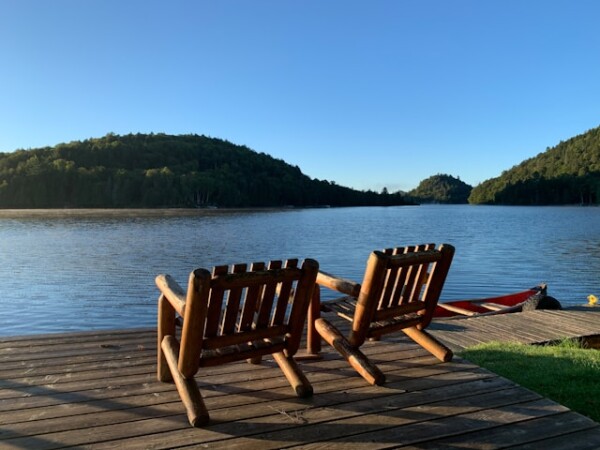Demolition
Crumbling on the banks of a lake in northern Appalachia sits a cabin that belonged to my grandmother. At this moment, hunched in front of my laptop in the pitch-dark, beneath cotton sheets, I find the back of my throat aches with the effort of holding back tears because I know they will become sobs.
It’s 2:13am and some combination of the record-breaking Texas heatwave and the knowledge that some version of me is dying has forced me awake. A streetlight outside my window glares down at its own wet reflection in the parking lot. Blood seeps slowly from a cut I’ve worried into my lower lip and I know it will heal slower than it used to when I was invincible – falling and bouncing back up like a pink rubber ball. I am 24 and the cabin sits vacant in the night.
The tears have begun to fall. My head feels detached from my body, floating over the American terrain like some unseen balloon. It bobs a straight line from southern suburbia to rural New York, stopping to hover quietly over hazy green mountains and snaking gravel roads. It recalls these same views blurring past rain droplet-ed car windows.
It makes its way north, to the cabin that they’re tearing down this summer.
*
The cabin is ancient. The foundation is cracked and you can tell by the damp, earthen smell within that it has been standing on that bank for longer than it should have been. One of the upstairs bedrooms has a black fly problem and the wooden banister creaks like an old woman’s joints.
But I was a girl there – balanced on my mother’s thin hip, grasping at the hem of my father’s swim trunks. I was even there while it’s previous owner was, once or twice. There are pictures of us sitting in the tiny nook between the mudroom and the kitchen, the wisps of a grin playing at the corners of her lips. She peeks up at the camera, her face angled down towards me. When I ask my father, he tells me that his mother was not a warm woman, but this photo feels warm to me. Her arm rests behind my head and the gapped smile that splits my face is a younger, fuller version of her own.
*
My grandmother died when I was five and I remember her funeral, but none of the moments in which her life overlapped with mine. Not the visits to her cabin or the years where we would’ve spoken on the phone for our birthdays, just a day apart. Not the way she would’ve relished in my love for books and reading and being read to. Not the way she would’ve watched my cousins and I playing in the deep green water of the lake, splashing each other and shrieking. I remember the itch of the seams on my black velvet funeral dress as they lowered her coffin into the verdant spring ground.
It is 2:27am and I am crying harder now, for a woman I never really met. My arms, held captive in the blue light from my laptop screen, are not the unmarred ones from the photograph. They are spotted and brushed with ginger hair, pocked by biopsy scars and a vast smattering of moles.
*
My aunt and uncle have been wanting to tear the cabin down for years, build a new house altogether. And I get it, I really do. It’s old. Old, old, old. That’s what I keep telling myself. It smells old and feels old and looks old and it’s chipping and splintering and probably not all that safe anymore but god, I was a girl there.
I was sunburnt and freckled and scraped and bruised and laughing and crying and screaming and playing and running there. I was light still. A young animal, I jittered and bent and climbed in that cabin, on that dock, above that water. I was there the last summer I was free of the weight and shape of womanhood.
I was eleven and scrawny and already getting tall. My cousin and I challenged each other to swim across “the entire lake,” which the adults didn’t tell us didn’t actually mean anything because the lake itself is shaped sort of like a capital L. And I wasn’t rounded yet, chubby in the middle and top-heavy. So we swam and we swam for what felt like hours but was probably ten minutes while one of the adults followed us on a canoe, I think. About halfway through, as our limbs began to ache with an invisible heaviness, a wave of adrenaline kicked in and we dove beneath the surface, pushing forward blindly into the darkness.
We made it to the bank opposite the cabin, my cousin and I. We made it there panting, clawing onto the pebbled shore with bellies full of murky water and triumph shining clear in our eyes. The memory ebbs away here. I know the hill where we landed is enormous, viewed through the dining room windows of the cabin. I know there’s a building there now, on the side of which is an electrified cross, set alight when darkness falls. It mars the rolling landscape that frames the water. But it wasn’t there then, the hill itself a fantastical, wide-open space sometimes dotted with cows.
We got back somehow, but I know we didn’t swim.
And I don’t remember these details, sitting in bed with tissues scattered about me like a nest – who was in the canoe (and was it even really a canoe?), how long it took to get there, how we got back – and I realize I haven’t tried to remember them in years. Maybe ever.
*
It is 2:39, the base of my neck is beginning to ache from craning down towards the keys in my lap, and I am trying to recall the color of the bunk beds in one of the upstairs bedrooms. The one with the flies that swarmed and flickered across our eyelids and mouths as us girl cousins tried to sleep without our skin crawling. They’re metal, I think. They’re sitting there now, as I sit here and try to ignore how taut the skin on my face feels, covered in dried salt water. But I am 24 and I cannot recall, though I was there last year. I cannot recall with any more certainty than I can recall that stupid canoe. I slept in those beds night upon childhood night. I slept there without a period or boobs or the crushing knowledge that my lifetime would be spent wondering which men see me as a human, and which are just good at hiding that they don’t.
I think the beds are blue. They might be gray.
My grandmother left them there for us.
*
I have a book of my grandmother’s that I found on a cabin bookshelf last year. It is a high school textbook of short stories, and her name is scrawled inside the cover in messy print that looks hauntingly like mine: Patsy Ross, Patsy Ross, Patsy Ross, over and over again until the lettering seems to unravel, fall apart like dry-rotted cotton as her hand tired or her attention waned. My aunt let me take it home, and I will never forget the way my chest began to ache when she told me that my grandmother “would’ve wanted me to have it.” A cliché, but my heart felt like it had chipped a bit.
My grandmother and I would’ve disagreed and laughed – or, I like to think so. She has been described to me by her own children as difficult. Ornery. An alcoholic with a mean streak that increased with age. And it’s not like I don’t believe them – what audacity. It’s just that I have to believe she would have been different. For me. That we would have been special. That we would have been kindred.
“Troubled,” they have called her, just as they have called me. I have to believe that, in my devastated teen years, she would have seen me as no one else could. She would have… Would she have patted my hand? Was she the type of woman who would’ve done such a thing? Or did she show her affection with her eyes, the way she seemed to in the photos I’ve seen?
I won’t know. I won’t ask. It would ruin the world that I have built where we are special. Where we are kindred.
*
There are few places where I fit. I can count on half a hand the places where the universe feels like it was meant to have me in it, because it would not have created them otherwise. One of them is a fraying cabin in Cuba, New York, now situated between two luxuriously renovated lake houses.
There is pain there for me, like I know there must have been for my grandmother. One does not die old without knowing pain. Everyone says she smoked and drank herself to death, but in the same way that I can’t imagine her being unkind, I can’t imagine her being so heartless as to leave us all behind that way. I look at her name on the inside of her book and the girl who wrote it…
I know she was innocent. I know the girl that exists within the confines of my dark skull was full of compassion. She, tiny and light-haired and round-faced, was kind like I was when my own handwriting mimicked hers – jerky and halting and sincere. Our little hands wrote our little names and the sharp feelings inside of us remained at bay for a little longer.
For me, the hurt comes from remembering all of the light that was lost between the summer after my parents’ divorce and the first summer I returned, fifteen and half-empty. I arrived at the cabin the same way I arrived anywhere at that age: exhausted and desperately frightened of my reflection in the mirror, my shadow on the ground, my body in the shower. I wore a huge sweatshirt that I used like a mobile sleeping bag and I sat in the painfully hard metal lawn chairs to watch the sun fall below the hilly landscape. Through the licking flames in the fire pit, the water seemed alien.
But, in that cabin, little me always knew she was wonderful. Her skin didn’t feel too tight, like it would begin to in the years to come. She walked the green earth and swam the green waters like a thing of nature, like a girl is meant to. Little me was barefoot and dirty and she smiled without worry for the way her front tooth overlapped the other. No one had told her yet that it made her look like a witch.
In that cabin on the edge of the lake, little me knew what humanness could be, what a gift innocence was, without ever realizing. She didn’t know her eleventh summer was her last until fall had already arrived.
It is 3:11 and I have to work tomorrow – selling beer bongs and sex toys at the store in the mall whose echoing music and dim lighting little me had always been so frightened of – so I should go to sleep. But I can’t help but feel like I am losing little me and my grandmother and my place in the world all at once. All over again. The beeping of a tow truck sounds off in the middle distance and the image of a bulldozer running its muddy treads over the desiccated corpse of the cabin appears like a flashbang before me.
It is infantile, I know that. But I cannot seem to face losing the cabin.
It’s incomprehensible to me that something so lovely and perfect and innocent could be destroyed in favor of something new and useful and safe,
that people could bring themselves to destroy the old, knowing it will never return,
that anyone could demolish a building where she lived, young and wide-eyed and wrinkled and dying,
that a person could shatter the ethereality and security that holds a little girl’s body like a cocoon.
And I know, if I asked, the answer would be so simple: They must. We must. The world moves on and memories fade, disappear into so much smoke as the hordes live and die and are buried. The July nights spent volleying whispered stories back and forth between sagging bunkbeds will vaporize one day. Our giggles, caught like gauze on the buzzing bodies of our black fly companions, will wander ever upward into the clear sky one morning, never to be heard again. But the little girl that lives in the cabin on the lake doesn’t know that.
Perhaps she will die in the cabin when it falls, crushed beneath beams, suffocating on dust. Or, perhaps, she lives on in my belief in ghosts and my fear of hurricanes and the way I take a little bit of joy in tying my shoelaces “the grown-up way.” Maybe the cabin lives on that way, too; in my copy of Short Stories for English Courses or my tendency to write with more fervor when I’m near the water.
In the end, the only thing certain is that, on the ground where the cabin stands now (where it will no longer be, where they will soon build anew), a little girl and her grandmother will always sit side by side.

Izzy Nameth Beck is an MFA student at Northern Michigan University. She is a Norton Writers Prize recipient and her other work can be found in the Long River Review. She loves her cat.



